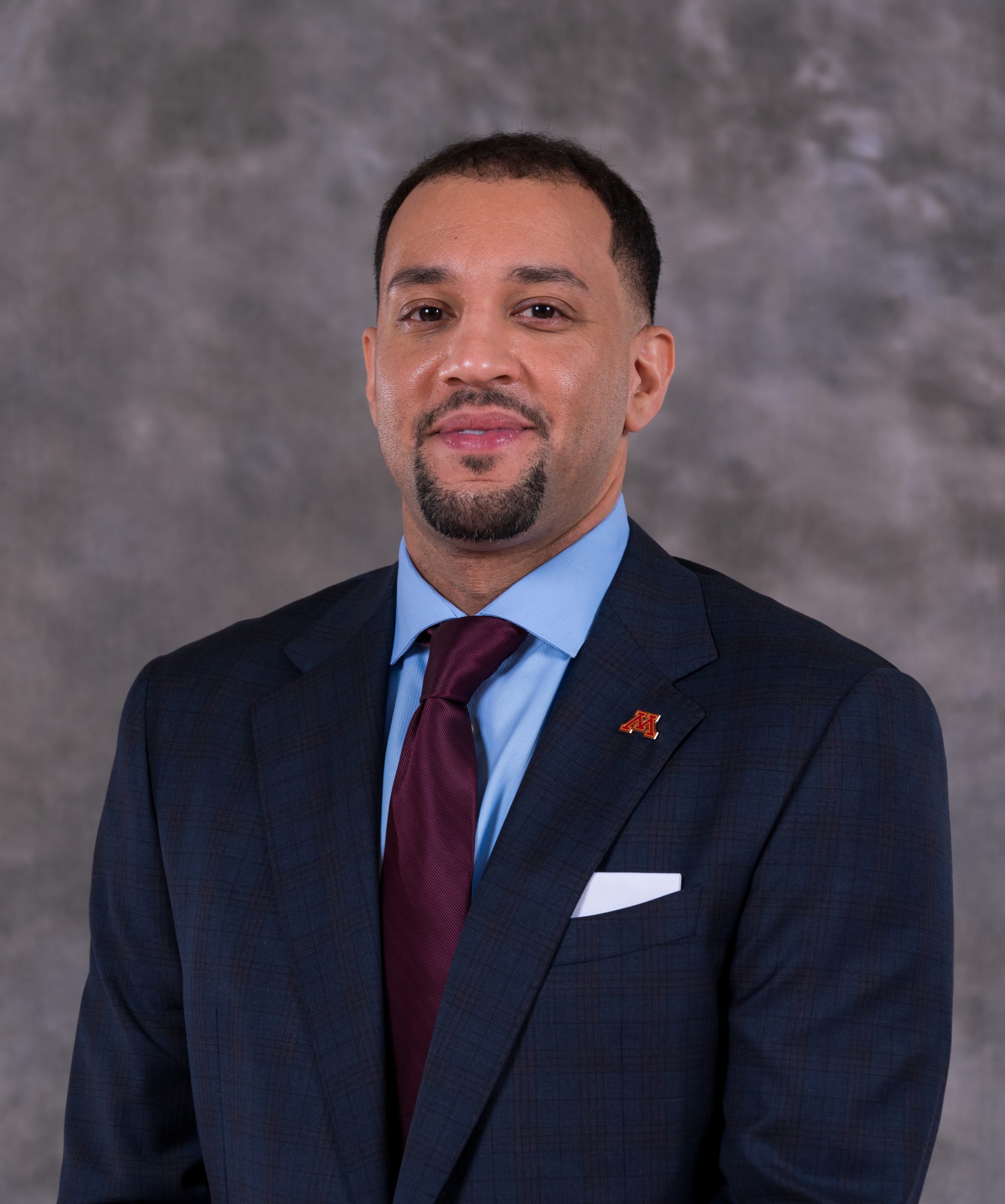Ben Johnson’s biggest jobs are helping his athletes navigate injustice and inspiring more diversity in the Big Ten’s whitest athletic department.
By Jarrett George-Ballard
Ben Johnson, the new head coach for the University of Minnesota Golden Gophers men’s basketball team, made his sentiments clear to all at a press conference shortly after his hiring this spring.
“I couldn’t be more excited to come home,” Johnson said.
But his home turf of Minneapolis has become rocky ground since the murder of George Floyd, the killing of Daunte Wright, the verdict of Derek Chauvin and the continuing protests on race and policing. This week, he told AccessU that as he reaches out to recruits, especially Black athletes, he addresses these issues head-on to build his future Gophers team.
“What I try to tell recruits and their families is if we think that the only place where there’s social injustice is right here in Minneapolis, then I think we’re crazy and naive,” Johnson said in an interview. “It’s unfortunate that Minnesota had to go through what we did… But I think we can use it as a positive on how to handle it and how to push forward, how to advocate for human rights, how to flip the narrative, because it’s something that Black people have to deal with.”
And as a high-profile Black coach in Minneapolis, does Johnson feel any special obligation to speak out on structural racism or disparities, particularly this year?
“I feel obligated because obviously I’m a Black man first, but I feel more obligated because I believe in equality,” he said. “And, I think I can look at it from a different lens because I experience racism as a Black man in society, and I go through different things that other people don’t have to experience.”
His advocacy is focused mostly on how he speaks to his athletes, he said.
“Everybody deserves justice, and everybody deserves basic, you know, human rights,” Johnson said. “We’ll continue to talk about it and continue to speak on it, and have open discussions, especially with my players and with my team, and just try to do our part in our own little bubble to help make change.”
Johnson, who was the assistant coach for the Gophers between 2013 and 2018, is the third Black head coach for the Gophers men’s basketball team, the last two being Tubby Smith and Clem Haskins. Jimmy Williams was a Black interim coach for half the season in 1986.
Johnson is also the fifth Black head coach in the University’s entire athletic history. That’s it.
When Johnson was hired in March, the University’s head coaching positions were all white and had been since 2013. He is now the only Black head coach at the least diverse athletic department of all the Big Ten universities, according to a Star Tribune analysis published earlier this year.
The lack of diversity in athletic leadership is a systemic issue in all college sports. The latest comprehensive NCAA data shows that starting in 2012, 94% of the Big Ten’s head coaches for basketball have been white men. During two of those years, 2014 and 2017, the figure was 100%.
Why so few Black coaches? One reason is that Black coaches end up paying their dues longer in the assistant coaching ranks, where they are often pigeonholed as recruiters, so they often don’t get a chance to showcase their full talents as coaches. Longtime connections among white coaches and athletic directors can often exclude Black coaches.
Sometimes it takes a push. Johnson spent 16 years as an assistant coach. When the University head coaching job opened up, speculation focused on San Diego State’s white head coach Brian Dutcher, the son of former Gophers coach Jim Dutcher. In early March, shortly before Johnson was announced as the pick, Kevin Warren, the first Black commissioner of the Big Ten, said he trusted the University would be “focused on doing the right thing.”
Warren and Johnson both know that the lack of Black head coaches is a problem not just for the coaches, but for the players and the sport. Leadership should reflect the players, especially because the number of Black college athletes is so high. In the Power 5 – Big Ten, Acc, Big 12, SEC and Pac-12 – the biggest sporting programs in the country, 50% of the players are Black compared to 14% of the coaches.
Representation in coaching boosts the confidence of Black student-athletes, especially those who attend predominantly white institutions. At his initial press conference, Johnson said he was excited about his hiring because he understood the importance of being a Black leader of young Black men, especially for a major basketball program.
“It’s an unbelievable opportunity. Guys like myself haven’t been afforded opportunities like these in the past, and I come from the Big East, where I think we had the most diverse coaching staff in the country, and it is special,” Johnson said then. “Hopefully this change will be seen and duplicated around the country.”
But feeling good about potential and being able to speak out about what needs to happen at a place like the University of Minnesota or an environment like the Big Ten – those are two different things.
Johnson said this week he remains grateful and optimistic about the University of Minnesota’s support for Black leadership in basketball, specifically noting the legacies of Haskins, Williams, Smith and himself in such a short amount of time.
His main focus is his players. He pays attention to how they are taking in the news and makes sure he’s there to talk about what’s on their minds. “They’re hearing about it from somebody, so you might as well talk about it as a team and as a family,” he said.
He understands the importance of trying to diversify athletics.
“All I can do is try to do things the right way. And, you know, whether that’s opening doors for people in Minnesota or people across the country,” Johnson said. “If I can have success with the level I know I can, that hopefully will give other minorities, whether that’s skin color, whether that’s female, whether that’s whatever, an opportunity to break through the door.”
At this point, Johnson said he sees no structural challenges at the University preventing him from advocating for what he believes is important.
“As far as, you know, diversity and change in human rights and equality, I wouldn’t be here, wouldn’t have been as excited about this job if they didn’t align,” he said. “[The University has] given me a platform to speak freely and openly about my beliefs and my background and to tell my story. They’ve supported me. They’ve supported my staff supporting my players for almost two months, so they’ve been awesome… They’ve been great.”
Yet Johnson’s influence has limitations. He can certainly hire his own basketball coaches and staff, except a trainer and a strength coach. But obviously, he cannot hire on behalf of other sports.
And it’s not certain how the gatekeepers who manage his time will limit his ability to spread his influence.
AccessU has been waiting for a long time to talk with Johnson. From his hiring announcement on March 22 until the end of the semester, we put in four requests to talk to him with athletic communications. We even emailed Mark Coyle, the director of athletics, and the entire basketball team in case that might make a difference. We explained to everyone we were a student publication devoted to centering the experiences, stories and voices of Black communities on the Twin Cities campus.
But our requests to speak to Johnson were consistently denied from the athletic communications person fielding our emails. The response was that he was too busy.
We understood we were a new name on campus. But still, we wondered if our requests had ever gotten to Johnson. We thought he might have wanted to speak with us – a news site about Black student communities at the university where his athletes play.
As it turns out, Johnson was happy to chat. The first he heard of our request was at the beginning of May. And that was only after we contacted athletic communications one more time to say we were running a commentary and wanted to know, for the record, if any of our previous requests had gotten through to him. The interview approval came within a few days.
It’s a lesson for us all, including Johnson, as we make our way out of this year of racial reckoning: Be grateful for the opportunities, yes; and be persistent and watchful.

